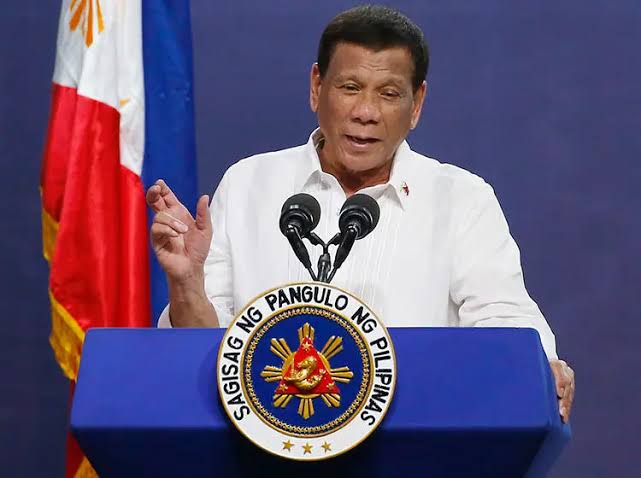Roderigo Duterte – travails of a Strongman, and the politics of Justice
By Femi Olugbile
Rodrigo Roa Duterte, aka Digong, or Rody, was the President of the Philippines from 2016 to 2022. Many people in this part of the world first became aware of that Southeast Asian country from the pronouncements and actions of President Duterte during his famous tenure. The world press was almost always agog with his stark, ‘devil may care’ statements on his own version of Law and Order, and the even more drastic actions visited on his people in pursuit of his vision. The Philippines was rife with drug-related crimes, local insurrections and chaos caused by bandits and sundry miscreants, in the same way as were Nigeria, South Africa and several other African and Third World countries at that time.
Duterte, while campaigning for the highest office in his country, through his PDP-Laban party (the acronym has a familiar ring to Nigerian ears, but that is where the similarity ends!) made no bones about his mission. He was, he said, going to kill ‘tens of thousands’ of criminals and eradicate crime in the country within six months. His presidency, he promised, would be ‘a bloody one’. He was dismissive of the constraints imposed by Courts and Lawyers, and he promised that nobody would need to worry about ‘legal’ or ‘democratic’ consequences in carrying out whatever presidential orders he issued. He would pardon himself, the police and soldiers before the end of his six-year tenure, to ensure that executive impunity was total while he cleansed the nation.
Duterte’s prior track record, especially when he was Mayor of Davao, made it obvious that this was no idle bluster, designed to gain cheap popularity for election. It was public knowledge that, as Mayor, he had personally killed some criminal suspects, and that there were extrajudicial killings of drug dealers, ‘terrorists’, petty criminals and ‘street children’ going on.
The six years of controversial rule of this ultra-nationalist and populist President which ensued proved that he was as good as his word.
So faithfully did Duterte adhere to his script, and so loud was the outcry among the human rights and civil society organisations locally and internationally that, two years into his Presidency, the International Criminal Court in the Hague opened a preliminary investigation against him.
President Duterte’s response was swift, and not squeamish. He withdrew his country from the treaty that gave jurisdiction to the ICC.
But politics, as they say, can be a bitch.
Duterte’s tenure came to an end eventually.
In June 2022, a new President emerged in the Philippines. He was Bongbong Marcos, second child and only son of the Ferdinand Marcos, a previous President of the Philippines, and his wife Imelda – who was famous as possibly the greatest spendthrift ever to occupy the office of First Lady anywhere in the world, as illustrated by her ‘uncountable’ hoard of designer shoes which were displayed to the public after the elder Marcoses were chased from the Presidential Palace into exile by a popular revolt. History has turned full circle, and Marcos the son is now ensconced in the Presidential Palace in Manila.
Duterte, despite his take-no-prisoners governance, did not succeed in totally ‘eradicating crime’ from the Philippines. Drug business, criminal behaviour and sectarian political insurgency remained problems that the people had to endure in their daily lives.
While the new President Marcos was no apologist for drug pushers and other criminals, he balked at the notion of ‘crimes against humanity’, and did not believe the Philippines should be a haven for human rights abusers.
On March 11, 2025, ex-President Roderigo Duterte was arrested and transferred to the Hague to face charges of Crimes Against Humanity. He became the first Asian leader to face trial before the ICC, joining the ranks of African warlords and politicians who have faced trial at the court. His trial will resume in September, and it is bound to open several cans of worms in the full glare of an avidly watching world. Apart from the sensational revelations expected from victims and their families, the issue of accountability and the possibility of being held to task after political office would raise worries in the minds of many political leaders in Africa and the Third World at large.
The flaws in the conception and operation of the International Criminal Court remain obvious, such as the fact that its ‘Justice’ appears to pertain only to errant brown and black-skinned leaders in Africa and Asia. Some countries are not signatories to the enabling Rome Statute. Countries such as the USA, United Kingdom and Israel hold themselves to be above the justice it offers, and none of their citizens are likely to be arraigned at the Hague anytime soon. The CIA and other state operatives who routinely arrange coups in other countries and who have assassinated leaders such as Patrice Lumumba in the Congo in the past are never likely to get into the custody of the ICC.
Still, the world is what it is, and perhaps ‘half bread is better than none’.
The story of President Roderigo Duterte, aka Rody, aka Digong, is not at an end, by any means. He remains a powerful, popular and very divisive figure in the Philippines. Recently the unrepentant 80-year-old man won a landslide electoral victory to be Mayor again in his hometown and stronghold of Davao.
A legal issue has now arisen about how he will be sworn into the office of Mayor, and the implications for the Philippines and the ICC. Can Duterte be sworn into office in Davao while he is physically incarcerated thousands of miles away in the Hague? Should he even be allowed to take the oath of office, or should the ‘mandate’ of the people of Davao be ignored?
Will the concluding chapter of the story of this Strongman of the Philippines be written by Justice, or by Politics?
The world waits, with bated breath.

